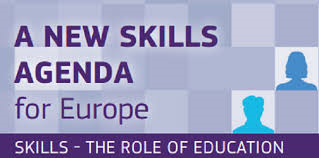A new skills agenda for Europe. Working together to strengthen human capital, employability and competitiveness.
Strand 1: Improving the quality and relevance of skills formation
Action 1: strengthening the foundations: basic skills. Commission proposal for a council recommendation on establishment of a skills guarantee (June 2016)
To reduce the high number of low-skilled adults in Europe, the Commission is proposing that a Skills Guarantee is established in cooperation with social partners, education and training providers. The Skills Guarantee will provide to adults who lack upper secondary school qualification:
A skills assessment (identification of existing skills and upskilling needs)
A tailored learning offer
Opportunities for the validation and recognition of the acquired skills.
Action 2: Building resilience: key competences and higher, more complex skills. Commission proposal to review the Key Competences for Lifelong Learning with a special focus on promoting entrepreneurial mindsets, and the accompanying European Reference Frameworks (end 2017)
The Commission has developed two specific frameworks to ensure common understanding and foster citizens’ digital competences (DigComp) and entrepreneurial competences (EntreComp).
Action 3: Making VET a first choice. Commission proposals supporting VET modernisation, such as revision of EQAVET and ECVET (half 2017), supporting the implementation of the Riga Conclusions. Organization of a first European VET skills week in 2016.
Action 4: Getting connected: focus on digital skills. Launch of the ‘digital skills and jobs coalition’ (End 2016); inviting the Member States to develop comprehensive national digital skills strategies by mid-2017 on the basis of targets set by end 2016.
Strand 2:Making skills and qualifications more visible and comparable
Action 5: Improving transparency and comparability of qualifications. Commission proposal for the revision of EQF (June 2016). The revision will support a regular update of national qualifications systems, ensure common principles for quality assurance, ensure common principles for credit systems, encourage the use of EQF by wide range of partners, promote the comparability of qualifications.
Action 6: Early profiling of migrants’ skills and qualifications. Launch of the Skills Profile Tool for Third Country Nationals to support early profiling and document skills of asylum seekers, refugees and other migrants. (soon available online)
Strand 3: Advancing skills intelligence, documentation and informed career choices
Action 7: Better intelligence and information for better choices. Commission proposal for the revision of Europass (end 2016)
Action 8: Better intelligence and information for better choices. Further analysis and sharing best practice to tackle brain drain.
Action 9: Boosting skills intelligence in economic sectors. Launch Blueprint for Sectoral Cooperation on Skills (June 2016). The Blueprint is piloted in 2016 in a demand driven process in 6 sectors: maritime technology, automotive, space, defence, textile and tourism. For 2017: construction, steal, health, green technologies and renewable energies.
Action 10: Better understanding performance of graduates. Commission proposal for an initiative on Graduate Tracking (end 2017)
Other work in progress at EU and national level will help advance this Skills Agenda:
- Increasing learning opportunities. More work based learning and business-education partnerships (a possible quality framework for apprenticeships); more support for learners’ mobility (VET Mobility Scoreboard); more learning at the workplace; more opportunities to validate non-formal and informal learning (updates of guidelines on validation and the European Inventory of validation of non-formal and informal learning).
Supporting teachers and trainers.
Modernisation agenda for higher education.
